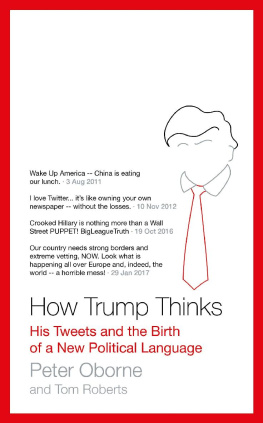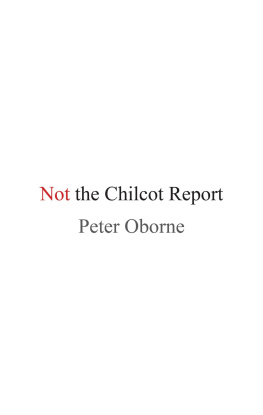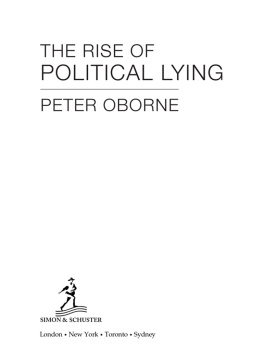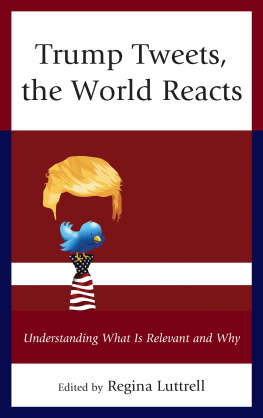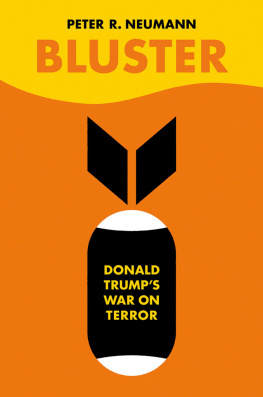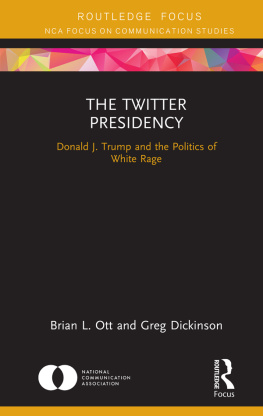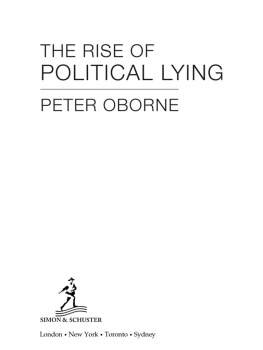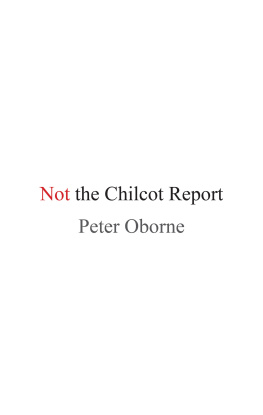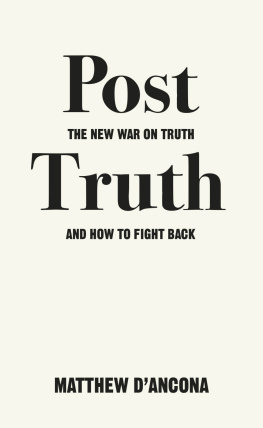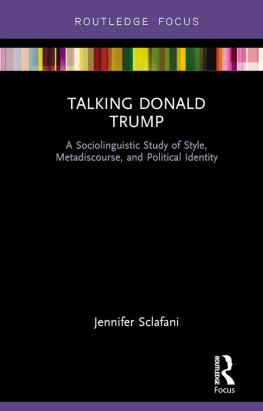HOW TRUMP THINKS
His Tweets and the Birth of a New Political Language
Peter Oborne and Tom Roberts
www.headofzeus.com

The most unusual feature of Donald Trumps nationalist and populist campaign for the presidency of the USA was his obsessive use of Twitter. Like other social media, Twitter has often been assumed to encourage liberal values and the circulation of facts. Trumps Tweets, by contrast, were a constant stream of provocations, insults, conspiracy theories, alternative facts and outright lies. And they helped him win power.
Peter Oborne, author of The Rise of Political Lying and Not The Chilcot Report, analyses Trumps incendiary presence in all its bewildering guises, and shows how this fusion of entertainment and cunningly crafted propaganda has destabilized the world's most powerful democracy.
I think that maybe I wouldnt be here if it wasnt for Twitter.
Twitter is a wonderful thing for me, because I get the word out I might not be here talking to you right now as President if I didnt have an honest way of getting the word out.
D ONALD T RUMP to Fox News, 15 March 2017
Contents
Please note that, while all original Tweet URLs are included in this digital edition of How Trump Thinks , some of them may cease to function after initial publication.
Before Donald Trump, politics had been captured by experts. They manipulated and policed public discourse. They set the rules. They believed that they alone understood the secrets and had mastered the techniques that won elections: focus groups; opinion polls; voter targeting.
Trump humiliated then destroyed these experts.
Raymond Chandler said that the thriller writer Dashiell Hammett gave murder back to the people who commit it.
Trump gave politics back to the people who vote.
He was by no means the first to achieve this. Indeed, the United States from its early history has been ready to respond to leaders and movements that turned angry and disappointed people against its ruling establishment.
But Trump achieved this in a number of new ways. The most significant of these was the reinvention of political communication through Twitter.
His Tweets brought politics back to life, playing a huge role in enabling the earthquake that took place in November 2016. He exploited Twitters ability to express raw sentiment instantly, without nuance or subtext, and its ability to blur, even extinguish, the boundary between sentiment and fact.
Donald Trumps Tweets are therefore a serious matter, worthy of study because they changed America and thus the world.
Donald Trump joined Twitter in 2009, only three years after the medium was invented. He wanted to promote his personal brand, to sell his books and to generate publicity for his TV programme, The Apprentice .
At this point he was not yet a politician, but a political groupie who flaunted his personality and boasted about his achievements. He was positive and upbeat, and sought out celebrities. He was friendly with Bill and Hillary Clinton (later to be eviscerated as Crooked Hilary).
They were more famous than he was. Trump basked in their celebrity.
He was also generous about President Obama, later to become the subject of prolonged, vicious attack. At this point Trumps Tweets display intellectual and moral horizons defined by TV ratings, ostentatious wealth, celebrity endorsements and brand management. Politics for him was a variety of show business.
Peter Costanzo, a marketing expert, introduced Trump to Twitter. Trump had produced a book: Think Like a Champion : An Informal Education in Business and Life. Costanzo, an online marketing director, argued that a Twitter account would boost sales.
Costanzo told the future US President: Lets call you @RealDonald Trump.
Trump said: I like it. Lets do it.
Costanzo later recalled: He seemed very excited about the idea of being able to reach people so directly. I think he immediately got it.
Only 216 people followed Trump when he began tweeting in May 2009, and for a long time the number increased slowly. His early Tweets were dull and with good reason: public relations advisers seem to have taken care of his first utterances in the medium.
The tone changed in the summer of 2011 when he toyed with running in the following years Presidential election. Donald Trump was still fascinated by celebrities, TV ratings and brand endorsements. But the mood was no longer so benign. He brutally parted company from the code of mutual congratulation that defines celebrity relationships.
Now he wrote his own Tweets on his personal Samsung mobile phone. Trump started to use the exclamation marks, the capital letters and the staccato insults that have defined his Twitter discourse ever since.
He made enemies, pursued feuds and communicated a sense of apocalyptic doom.
He was very funny and often acute: Wake up America China is eating our lunch, wrote Trump in early August 2011. Here at last was Donald Trumps unique voice. All creative artists are familiar with the thrilling moment when they discover a voice capable of talking to the world. So too are politicians.
The 140-character Twitter message was perfect for Trump. It was ideal for painting pictures of a black-and-white world. In the hands of Trump it became a lethal political weapon.
Trump told lies, smeared and fabricated in order to destroy opponents. If the facts proved what he was saying to be untrue, Trump didnt care. He constructed a personal epistemology. His truth claims were purely instrumental. He made assertions about his own honesty and the lies of his enemies in order to gain power and win arguments.
According to the rules of conventional politics, this resort to deceit should have been the end of Trump. The media would duly have exposed him as a liar, and as a result he should have remained a fringe figure.
Most informed people were certain he would be discredited. But his failure and disgrace never transpired, and he became President. What happened?
Trump the heir of tradition
Trump won as the heir to two great American traditions. One is contempt for the elite, real or imaginary, in charge of Washington politics, expressed in periodic fits of populism. The second is that of fake news the successful conversion of propaganda into fact.
Both of these traditions were very powerful in the nineteenth century.
The first great anti-Establishment Presidential candidate was Andrew Jackson. He gatecrashed national politics with a (generally deserved) reputation as a military hero and a white nationalist, who on his own initiative had launched wars against Indians and Spaniards.
He also gave the vote in conquered Florida to all free (white) men without property qualifications. His programme mobilized mass democracy to overcome vested interests and perceived corruption in Washington, especially in the operations of the banks.
As Trump would later do, Jackson used exaggerated rhetoric against his collective enemy, The Great Whore of Babylon.
Jacksons astute chief of staff, Major (later Senator) Eaton codified his thoughts into a programme for delivering the country from the Hands of Mammon. With the aid of Democratic newspapers, Jackson and Eaton fashioned the first real nationwide Presidential campaign in 1824. He was balked of victory by a private deal between two rivals, John Quincy Adams and Henry Clay, which he described in very Trumpian terms as a corrupt bargain.

